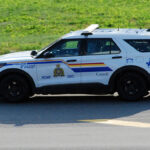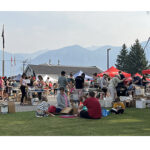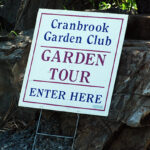Home »

Composting helps spread city funds
Near the City of Cranbrook’s sewage lagoons, at the eastern entrance to town, is a large, steaming pile of… compost.

On a cool Nov. 12 morning, Mathew Pocock, City of Cranbrook Arborist/Horticulturist led a media tour of the Public Works yard on Cobham Avenue, and of the city compost operation at the sewage treatment lagoon area.
Standing before a six to seven foot high compost pile, mildly odiferous in the crisp air, Pocock explained the necessities and values of such a collection of waste, including benefits to taxpayers.
About 60 to 80 feet long and as wide as a pickup truck, the compost pile is composed mostly of grass clippings, leaves, flowers pulled from city gardens and baskets, as well as soil and random weeds.
“You have to be careful not to create a seed bank,” from weeds, Pocock said, explaining that if a compost pile is managed properly, enough heat is created from microbial breakdown to halt a seed bank.
Proper balance is vital to keeping the best compost pile, he said.
“If you have too much carbon and not enough nitrogen, you won’t get enough activity,” he said, adding, “Grass really heats up the compost pile; it is the heat that kills the weeds and seeds.”
Atop the city pile was a thin layer of recent snow; a deceptive cool.
To make his point, he scratched away the surface layer on the side of the pile and dug his hand in up to his elbow, unleashing a billow of steam.
“You can barely even put your hand in there” at times, Pocock said.
He explained that the pile is turned “now and then” to ensure “the heat process” is as evenly distributed as possible, he said.
Standing back up and brushing off his hands, Pocock said composting helps the city save money.
“Soil is a really hard thing to find out here,” he said, pointing out that decomposition occurs more slowly in the Rockies than the Lower Mainland.
Keeping active and ready compost piles “not only saves money” but it is better for the soil, too, Pocock said.
Summer 2014, as it turns out, was a successful one for the city’s composting program.
“Last year was kind of an eye opener. It worked really well,” Pocock reported.
He also offered some tips on creating your own compost pile, beginning with, “you want your pile to be significant size,” with a minimum of a cubic metre, volume-wise (3 x 3 x 3 feet).
He suggests that you add to it and mix it at least once a month “and don’t let it get dry.” When mixing a compost pile, Pocock recommended you spread your pile out and then push back together.
He also recommends keeping meat products out of your compost pile because they attract vermin and meat fats “slow things down. There is also potential for human borne diseases.”
Pocock advises that you don’t use your compost before it is ready.
“The process can take a couple of months before it is ready to use,” he said.
Still active compost being dug into soil can damage some plants roots, he explained.
“The final breakdown product” from a compost pile is humus. “It is finer than silt or clay almost,” Pocock said.
According to the University of B.C.: “Nature is a wonderful recycler! A composting pile helps turn old plants and things like vegetable peelings, dead leaves and grass clippings into food and soil for new plants to grow. Compost helps plants grow because it supplies nutrients to feed plants. These nutrients were originally part of living plant tissues, but they are released when the plants are broken down. In this way, composting is an important kind of recycling. Worms and insects are an important part of composting because they help to create air pockets for air and water. Air and water in the soil benefits plant roots and creates a healthy environment for soil animals and beneficial microbes, and all of these help plants grow. Much of what we throw away can either be recycled or composted, so composts also mean there is less garbage that ends up in landfills.”
Lead image: Mathew Pocock jams a hand into the city compost pile to demonstrate how active the pile remains well, even in cool November temperatures.
Ian Cobb/e-KNOW







